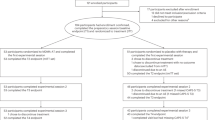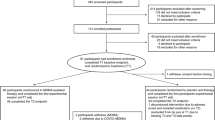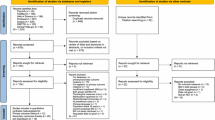Abstract
Study design
Qualitative Cohort Study.
Objectives
Many people with long-term spinal cord injury (SCI) develop adaptation strategies to succeed. Understanding the factors that support their capacity to adapt and develop is important to enhance quality of life of others with SCI. This study aims to learn how these factors influence how people with SCI attain and maintain optimal quality of life as time since injury grows.
Setting
IL, USA.
Methods
A qualitative approach using one-on-one structured interviews with 16 individuals with long-term SCI was used to elicit perspectives of topics of importance. Analysis of these topics was done for the entire group, and for subgroups based on injury duration, i.e., 1–5 years, 5–15 years, and 15+ years post-injury. Deductive and inductive analyses of transcripts were performed.
Results
Five important themes emerged: 1. Injury, Medical Care, and Rehabilitation; 2. Built Environment and Accessibility; 3. Relationships and Support Systems; 4. Intrapersonal Thoughts and Emotions; and 5. Handling Challenges and Adversity. Topics of importance evolved over time. Most important were: 1–5 years: injury and recovery process; 5–15 years: navigating the community and how to handle difficult situations; and 15+ years: self-reflection and understanding how to handle challenges positively.
Conclusions
Recognition of the factors (e.g. resilience, self-acceptance, built environment) that contribute to quality of life in people with SCI, and their prevalence over time, enables development of strategies to facilitate personal fulfillment and favorable adaptation at each stage.
Trial registration
This trial was posted on clinicaltrials.gov under NCT04544761.
This is a preview of subscription content, access via your institution
Access options
Subscribe to this journal
Receive 12 print issues and online access
$259.00 per year
only $21.58 per issue
Buy this article
- Purchase on Springer Link
- Instant access to full article PDF
Prices may be subject to local taxes which are calculated during checkout
Similar content being viewed by others
Data availability
De-identified transcript data can be obtained by contacting the corresponding author.
References
Medicine Io. Workshop on Disability in America: A New Look: Summary and Background Papers. In: Field MJ, Jette AM, Martin L, editors. Washington, DC: The National Academies Press; 2006. 292.
Groah SL, Charlifue S, Tate D, Jensen MP, Molton IR, Forchheimer M, et al. Spinal cord injury and aging: challenges and recommendations for future research. Am J Phys Med Rehabil. 2012;91:80–93.
Hitzig SL, Eng JJ, Miller WC, Sakakibara BM, Team SR. An evidence-based review of aging of the body systems following spinal cord injury. Spinal Cord. 2011;49:684–701.
Tsai IH, Graves DE, Chan W, Darkoh C, Lee MS, Pompeii LA. Environmental barriers and social participation in individuals with spinal cord injury. Rehabil Psychol. 2017;62:36–44.
Reinhardt JD, Middleton J, Bokel A, Kovindha A, Kyriakides A, Hajjioui A, et al. Environmental barriers experienced by people with spinal cord injury across 22 countries: results from a cross-sectional survey. Arch Phys Med Rehabil. 2020;101:2144–56.
Akter F, Islam S, Haque O, Hossain A, Hossain K, Imran M, et al. Barriers for individuals with spinal cord injury during community reintegration: a qualitative study. Int J Phys Med Rehabil. 2019;7:2.
Babamohamadi H, Negarandeh R, Dehghan-Nayeri N. Coping strategies used by people with spinal cord injury: a qualitative study. Spinal Cord. 2011;49:832–7.
Anderson CJ, Vogel LC, Chlan KM, Betz RR. Coping with spinal cord injury: strategies used by adults who sustained their injuries as children or adolescents. J Spinal Cord Med. 2008;31:290–6.
Rohn EJ, Nevedal AL, Tate DG. Narratives of long-term resilience: two cases of women aging with spinal cord injury. Spinal Cord Ser Cases. 2020;6:23.
Rohn EJ, Tate DG, Forchheimer M, DiPonio L. Contextualizing the lived experience of quality of life for persons with spinal cord injury: A mixed-methods application of the response shift model. J Spinal Cord Med. 2019;42:469–77.
Simpson E, Sawatzky B, Forwell S, Backman CL, Symington D, Vu M, et al. A mixed-methods study exploring and comparing the experiences of people who sustained a spinal cord injury earlier versus later in life. Spinal Cord. 2022;60:706–11.
Duggan C, Wilson C, DiPonio L, Trumpower B, Meade MA. Resilience and happiness after spinal cord injury: a qualitative study. Top Spinal Cord Inj Rehabil. 2016;22:99–110.
White B, Driver S, Warren AM. Resilience and indicators of adjustment during rehabilitation from a spinal cord injury. Rehabil Psychol. 2010;55:23–32.
Geard A, Kirkevold M, Lovstad M, Schanke AK. Exploring narratives of resilience among seven males living with spinal cord injury: a qualitative study. BMC Psychol. 2018;6:1.
Monden KR, Trost Z, Catalano D, Garner AN, Symcox J, Driver S, et al. Resilience following spinal cord injury: a phenomenological view. Spinal Cord. 2014;52:197–201.
Kornhaber R, McLean L, Betihavas V, Cleary M. Resilience and the rehabilitation of adult spinal cord injury survivors: A qualitative systematic review. J Adv Nurs. 2018;74:23–33.
MacLeod S, Musich S, Hawkins K, Alsgaard K, Wicker ER. The impact of resilience among older adults. Geriatr Nurs. 2016;37:266–72.
VanMeter F, Cicchetti D. Resilience. Handb Clin Neurol. 2020;173:67–73.
Tsoy N, Langewitz W, Muri S, Notter S, Pannek J, Post MWM, et al. Quality of life from the patient perspective at the end of the first rehabilitation after the onset of spinal cord injury/disorder - A qualitative interview-based study. J Spinal Cord Med. 2023:1–12. https://doi.org/10.1080/10790268.2023.2263235. Epub ahead of print.
O’Brien BC, Harris IB, Beckman TJ, Reed DA, Cook DA. Standards for reporting qualitative research: a synthesis of recommendations. Acad Med. 2014;89:1245–51.
Bingham AJ, Witkowsky P. Deductive and inductive approaches to qualitative data analysis: SAGE Publications; 2022.
Windle G, Markland DA, Woods RT. Examination of a theoretical model of psychological resilience in older age. Aging Ment Health. 2008;12:285–92.
Iacoviello BM, Charney DS. Psychosocial facets of resilience: implications for preventing posttrauma psychopathology, treating trauma survivors, and enhancing community resilience. Eur J Psychotraumatol. 2014;5:1–10.
deRoon-Cassini TA, Mancini AD, Rusch MD, Bonanno GA. Psychopathology and resilience following traumatic injury: a latent growth mixture model analysis. Rehabil Psychol. 2010;55:1–11.
Kaiser S, Kennedy P. An exploration of cognitive appraisals following spinal cord injury. Psychol Health Med. 2011;16:708–18.
Huang CY, Chen WK, Lu CY, Tsai CC, Lai HL, Lin HY, et al. Mediating effects of social support and self-concept on depressive symptoms in adults with spinal cord injury. Spinal Cord. 2015;53:413–6.
Rapkin BD, Schwartz CE. Toward a theoretical model of quality-of-life appraisal: implications of findings from studies of response shift. Health Qual Life Outcomes. 2004;2:14.
Acknowledgements
This work was supported by the Kiwanis Neuroscience Research Foundation, the Foundation for Physical Medicine and Rehabilitation, and the Shirley Ryan AbilityLab. We would like to thank Dr. Marquis Winston for interviewing our final study participant.
Funding
This study was supported by the Kiwanis Neurological Research Foundation, the Foundation for Physical Medicine and Rehabilitation, and the Shirley Ryan AbilityLab.
Author information
Authors and Affiliations
Contributions
EJR was responsible for inception of the study, obtaining funding, writing protocol, interpreting results, finding interview themes, and writing this manuscript. LL was responsible for study inception, writing protocol, reviewing transcripts, finding interview themes and topics, and writing this manuscript. AJB was responsible for writing the protocol, conducting all interviews, creating study documents, data collection, writing the code for transcription, disseminating de-identified transcripts to the study team, finding interview themes, manually coding all transcripts into themes, coded data analysis, and the writing of this manuscript.
Corresponding author
Ethics declarations
Competing interests
The authors declare no competing interests.
Ethical approval
This study was approved by the Northwestern University Institutional Review Board.
Additional information
Publisher’s note Springer Nature remains neutral with regard to jurisdictional claims in published maps and institutional affiliations.
Supplementary information
Rights and permissions
Springer Nature or its licensor (e.g. a society or other partner) holds exclusive rights to this article under a publishing agreement with the author(s) or other rightsholder(s); author self-archiving of the accepted manuscript version of this article is solely governed by the terms of such publishing agreement and applicable law.
About this article
Cite this article
Roth, E.J., Lovell, L. & Barry, A. Perspectives on factors influencing quality of life in persons with long-term spinal cord injury: a qualitative study. Spinal Cord (2024). https://doi.org/10.1038/s41393-024-00991-w
Received:
Revised:
Accepted:
Published:
DOI: https://doi.org/10.1038/s41393-024-00991-w



